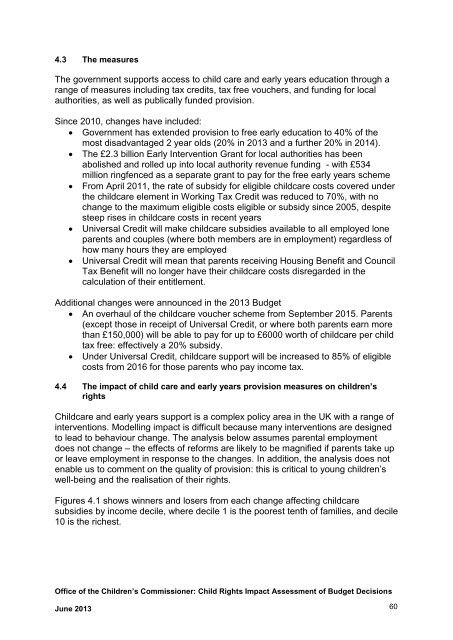force_download.php?fp=/client_assets/cp/publication/676/A_Child_Rights_Impact_Assessment_of_Budget_Decisions
force_download.php?fp=/client_assets/cp/publication/676/A_Child_Rights_Impact_Assessment_of_Budget_Decisions
force_download.php?fp=/client_assets/cp/publication/676/A_Child_Rights_Impact_Assessment_of_Budget_Decisions
Create successful ePaper yourself
Turn your PDF publications into a flip-book with our unique Google optimized e-Paper software.
4.3 The measures<br />
The government supports access to child care and early years education through a<br />
range <strong>of</strong> measures including tax credits, tax free vouchers, and funding for local<br />
authorities, as well as publically funded provision.<br />
Since 2010, changes have included:<br />
Government has extended provision to free early education to 40% <strong>of</strong> the<br />
most disadvantaged 2 year olds (20% in 2013 and a further 20% in 2014).<br />
The £2.3 billion Early Intervention Grant for local authorities has been<br />
abolished and rolled up into local authority revenue funding - with £534<br />
million ringfenced as a separate grant to pay for the free early years scheme<br />
From April 2011, the rate <strong>of</strong> subsidy for eligible childcare costs covered under<br />
the childcare element in Working Tax Credit was reduced to 70%, with no<br />
change to the maximum eligible costs eligible or subsidy since 2005, despite<br />
steep rises in childcare costs in recent years<br />
Universal Credit will make childcare subsidies available to all employed lone<br />
parents and couples (where both members are in employment) regardless <strong>of</strong><br />
how many hours they are employed<br />
Universal Credit will mean that parents receiving Housing Benefit and Council<br />
Tax Benefit will no longer have their childcare costs disregarded in the<br />
calculation <strong>of</strong> their entitlement.<br />
Additional changes were announced in the 2013 <strong>Budget</strong><br />
An overhaul <strong>of</strong> the childcare voucher scheme from September 2015. Parents<br />
(except those in receipt <strong>of</strong> Universal Credit, or where both parents earn more<br />
than £150,000) will be able to pay for up to £6000 worth <strong>of</strong> childcare per child<br />
tax free: effectively a 20% subsidy.<br />
Under Universal Credit, childcare support will be increased to 85% <strong>of</strong> eligible<br />
costs from 2016 for those parents who pay income tax.<br />
4.4 The impact <strong>of</strong> child care and early years provision measures on children’s<br />
rights<br />
<strong>Child</strong>care and early years support is a complex policy area in the UK with a range <strong>of</strong><br />
interventions. Modelling impact is difficult because many interventions are designed<br />
to lead to behaviour change. The analysis below assumes parental employment<br />
does not change – the effects <strong>of</strong> reforms are likely to be magnified if parents take up<br />
or leave employment in response to the changes. In addition, the analysis does not<br />
enable us to comment on the quality <strong>of</strong> provision: this is critical to young children’s<br />
well-being and the realisation <strong>of</strong> their rights.<br />
Figures 4.1 shows winners and losers from each change affecting childcare<br />
subsidies by income decile, where decile 1 is the poorest tenth <strong>of</strong> families, and decile<br />
10 is the richest.<br />
Office <strong>of</strong> the <strong>Child</strong>ren’s Commissioner: <strong>Child</strong> <strong>Rights</strong> <strong>Impact</strong> <strong>Assessment</strong> <strong>of</strong> <strong>Budget</strong> <strong>Decisions</strong><br />
June 2013 60



